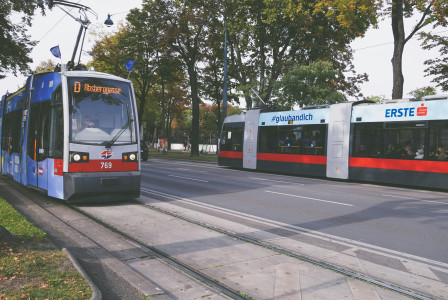Policy
25 November 2024
Austria's 2030 Mobility Master Plan: Path to climate neutrality by 2040
Policy
25 November 2024
Adventure tourism
Coastal, maritime and inland water tourism
Cultural tourism
+20 more
Login / create an account to be able to react
-
65

In 2021, Austria's Federal Ministry for Climate Action, Environment, Energy, Mobility, Innovation and Technology (BMK) launched a national mobility strategy aiming for climate neutrality by 2040, focusing on reducing traffic, promoting sustainable transport, and enhancing efficiency.
Federal Ministry for Climate Action, Environment, Energy, Mobility, Innovation and Technology of Austria
Topics
Austria
Academic / Research and VET Institutions
Company with 250 or more employees
Consumer Organisations
Cultural and Heritage Organisations
Destination Management & Marketing Organisations
EU Institutions
Financial Institutions and Investors
Industry Associations and Chambers of Commerce
International Organisations
Local Authorities
Media / Journalist Organisations
National authorities
Networks and Federations / Confederations
NGOs / Non-profits
Regional Authorities
SMEs (a company with less than 250 employees)
Trade Unions
-
Specific types of tourism
-
-
Adventure tourism
-
Coastal, maritime and inland water tourism
-
Cultural tourism
-
Ecotourism
-
Education tourism
-
Festival tourism
-
Gastronomy tourism
-
Health and medical tourism
-
MICE tourism
-
Mountain tourism
-
Religious tourism
-
Rural tourism
-
Sports tourism
-
Urban/city tourism
-
Wellness tourism
-
-
Transition Pathway Strategic Areas
-
-
Multimodal travelling
-
Sustainable mobility
-
Tourism strategies
-
-
Business activities
-
-
Air passenger transport
-
Other tourism transportation activities
-
Rail Passenger transport
-
Road passenger transport
-
Water (sea, coastal and inland) passenger transport
-
Share
The Federal Ministry for Climate Action, Environment, Energy, Mobility, Innovation and Technology (BMK) of Austria released a national mobility strategy in 2021 to transform the mobility sector in accordance with the Paris Climate Agreement, aiming for climate neutrality by 2040. The strategy's primary objectives are to achieve climate neutrality and a mobility transition by 2040, increase the use of zero-emission vehicle technologies, and enhance climate-neutral technology in freight transport. The plan focuses on three core areas: reducing traffic, shifting to more sustainable transport modes, and improving the efficiency of all transport modes.
The strategy also includes specific targets for passenger and freight transport, legal frameworks, economic mechanisms such as carbon pricing, and initiatives to raise public awareness and manage mobility. For a comprehensive analysis and further insights, please refer to the linked source on the left-hand side of the platform.
#Mobility #Public transportation #Climate action #Low-emission vehicles
Documents
Comments (0)
Related content
See also
European Commission's Communication on Sustainable and Smart Mobility Strategy
- Categories
- Coastal, maritime and inland water tourism Cultural tourism Ecotourism +20 more
The Iberian cross-border travel initiative for 2022–2024
- Categories
- Coastal, maritime and inland water tourism Cultural tourism Ecotourism +42 more
Comprehensive guide to EU passenger rights
- Categories
- Coastal, maritime and inland water tourism Cultural tourism Ecotourism +19 more






